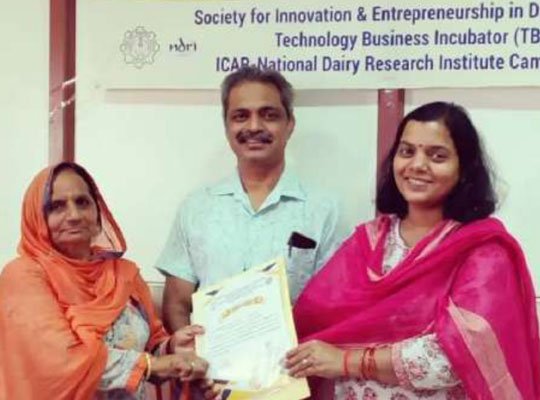
ALLIED
LIVELIHOODS
EXOTIC MUSHROOM CULTIVATION
1
2
In Himachal, average land holding size of farmers is about 1 hectares which limits their revenue. In Hamirpur region, the non-lucrative practice of the traditional farming of Wheat and Maize is forcing the villagers to leave for the urban areas in search of better income opportunities. Moreover, absence of proper irrigation facilities and menace created by wild animals is making people abandon farms. Hence, there is a need for a low cost and maximum profit plan to support their income.
Therefore, we identified two small groups of women farmers who already had the knowledge of cultivating common varieties of mushroom like button and oyster. The objective was simply to create a success story which gets scaled up by ripple effect. These group faced two major challenges; first, the profit margin for the varieties cultivated by them was small; second, they lacked the know-how to market their produce well. To address these issues, we designed a program to train the groups for exotic varieties of mushroom which have large profit margin and to establish a buyback mechanism by connecting them with different stakeholders of the mushroom industry.
For the identified groups, a 3-day course on cultivation of Ganedorma mushroom was conducted in two batches for the women of Gahli Panchayat and Loharkad Panchayat of Nadaun Block. The training was conducted by experts from Han Agro, a Dehradun based Mushroom Company. It included sessions on scientific cultivation, disease management and harvesting.
The groups were provided 555 substrate bags for free with the groups themselves purchasing another 408 bags from their end. The women farmers are now being guided on daily basis through video calls, so as to ensure that the substrate bags are provided the right conditions for optimum growth. They were also provided with digital meters for accurate reporting of room temperature and humidity. The groups have divided their work with a roster assigning duties to women in groups of two for morning, afternoon and evening sessions.
This mushroom based micro-enterprise would provide an opportunity to the women farmers to earn better at their native place itself and transform themselves from small farmers to agri-entrepreneurs. In future, they can even scale up their work through value addition and making products like Pickle, Cookies, Nuggets, Soup, Protein Powder, Papad etc. In long term, this would also help in addressing the problem of nutritional deficiencies in rural people.
Moving forward, more batches of women farmers would be similarly trained and assisted for marketing. It is also important to inform these groups about the existing government schemes which can help them in terms of investment support and scaling up their work. Eventually, a pool of mushroom-based micro enterprises would come up in the region which will make it competitive and transform the region into an export hub of medicinal/exotic mushroom.
Mushroom cultivation has great scope in India and in some of other developing countries because of the cheap and easily available raw materials needed for this activity,
Mushroom cultivation can directly improve livelihoods through economic, nutritional and medicinal contributions.
Globally, China is the leading producer of mushrooms with more than 70% of the total global production which is attributed to community based farming as well as diversification of mushrooms.
In India, owing to varied agro-climate and abundance of farm waste, different types of temperate, tropical and sub-tropical mushrooms are cultivated throughout the country.
Trade in cultivated mushrooms can provide a readily available and important source of cash income – for men and women, however, the role played by women in rural mushroom production can be very significant.
Recently, there has been a spectacular growth in, and commercial activity associated with, dietary supplements, functional foods and other products that are ‘more than just food’. Medicinal fungi have routinely been used in traditional Chinese medicine.
Today, an estimated six percent of edible mushrooms are known to have medicinal properties and can be found in health tonics, tinctures, teas, soups and herbal formulas. Lentinula edodes (shiitake) and Volvariella volvacea (Chinese or straw mushroom) are edible fungi with medicinal properties widely diffused and cultivated.
Shiitake are said to have anti and antiviral properties and remove serum cholesterol from the bloodstream.
Mushroom cultivation activities can play an important role in supporting the local economy by contributing to subsistence food security, nutrition, and medicine; generating additional employment and income.
Shiitake offers a market value of approximately 6 times more than other locally grown mushrooms such as button, oyster, etc. in Himachal Pradesh.
Since it does not require access to land, mushroom cultivation is a viable and attractive activity for both rural farmers and peri-urban dwellers and can provide a regular income throughout the year.
Mushrooms can be produced in temporary clean shelters. They can be cultivated on a part-time basis, and require little maintenance.
Indirectly, mushroom cultivation also provides opportunities for improving the sustainability of small farming systems through the recycling of organic matter, which can be used as land fertilizer. Through the provision of income and improved nutrition, successful cultivation and trade in mushrooms can strengthen livelihood assets, which can not only reduce vulnerability to shocks, but enhance an individual’s and a community’s capacity to act upon other economic opportunities.
And in order to deal with the biggest challenge of Market Linkage, a 100% buyback from the doorstep of the farmers/individuals, along with the training programme has been ensured.
So far, over 400 women have been trained across 15 villages to cultivate medicinal varieties like Ganedorma & Shiitake. For the identified groups, a 2-3 day training on cultivation of medicinal mushroom is conducted by industry experts which includes sessions on scientific cultivation, disease management and harvesting. The women farmers are then guided throughout the crop period, so as to ensure that the substrate bags are provided the right conditions for optimum growth. They are also provided with digital meters for accurate reporting of room temperature and humidity. The produce is then being collected from the doorsteps of the women farmers.
On an average, a woman is able to earn 7.5k to 20k by putting in 40 man-hours in a period of 2 months.
Post completion of buyback, the bags can be emptied into the fields as manure or used as fuel by the farmers. This mushroom based micro-enterprise would provide an opportunity to the women farmers to earn better at their native place itself and transform themselves from small farmers to agri-entrepreneurs.
In future, they can even scale up their work through value addition and making products like Pickle, Cookies, Nuggets, Soup, Protein Powder, Papad etc. In the long term, this would also help in addressing the problem of nutritional deficiencies in rural people.
Moving forward, more batches of women farmers would be similarly trained and assisted for marketing. It is also important to inform these groups about the existing government schemes which can help them in terms of investment support and scaling up their work. Eventually, a pool of mushroom-based micro enterprises would come up in the region which will make it competitive and transform the region into an export hub of medicinal/exotic mushroom.
WORKSHOP ON INTEGRATED FARMING
1
2
3
On-the-ground Research & Data Analysis done by ‘Act To Transform’; found lack of awareness, agricultural knowledge and entrepreneurial vision amongst the farmers, a major limitation in realizing higher profits by them. Therefore, a ‘3S’ strategy of Sensitization-Skilling-Supply was adopted to transform the lives of farmers in Himachal. As primary step, farmers from Hamirpur district were mobilized to take on scientific and smart agricultural practices.
The zeal amongst the farmers could be assessed through their active involvement in the discussion around natural, organic and spiritual farming. The workshop successfully infused enthusiasm among the attendees to learn and practice the robust mechanism of farming with support from Act to Transform.
Further, the interested farmers from Hamirpur would be provided certified training in beekeeping with the support from Rural Self- Employment & Training Institute (RSETI), Hamirpur. Col. P.C. Rana Ji will keep sharing his valuable insights with the farmers and would also assist the farmers in marketing their produce.
Act To Transform won’t limit its intervention to sensitizing and training alone, the trained farmers would be supported to supply their produce to the market. They will receive evidence based assistance to do value addition and reach out to the consumers right from their farm. We are also prepared to help farmers in getting their produce certified and packed. The ‘3-S’ strategy would transform the farmers into microentrepreneurs.

SCIENTIFIC DAIRY FARMING
As per surveys conducted by ‘Act to Transform’ in 30 different panchayats of district Hamirpur, it was observed that milk production in particular and its lucrative marketing in general is a key constraint to dairy development in the region and prior to addressing the marketing challenge it is essential that firstly, present levels of milk production in an identified cluster be estimated, Secondly, the farmers be trained to undertake scientific dairy farming so as to improve the quantity and quality of milk, Lastly, probable partners like cooperatives, private players and probable buyers be reached out simultaneously so that the marketing channel gets established in concurrence to training of the farmers.
We are also working with Society for Innovation & Entrepreneurship in Dairying (SINED) to prepare a training curriculum as per the priorknowledge, available resources and climatic conditions of the lower belt of western Himachal. Poor crop productivity, low availability of per capita arable land, substantial availability of common property grazing lands, and lack of other incomegenerating activities have made the rearing of dairy animals an economic compulsion in this region. Selecting the right breed of dairy cattle, technique to grow green silage, disease control, calf management, milk processing etc would ensure an increase in the income of farmers and upgrade the living standard of family members, especially of women, who in particular labor for dairy in the household without getting any pecuniary benefit.

